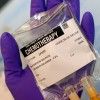Just as people may wheeze and itch in the presence of cats or pollen, a minority of cancer patients become allergic to the very drugs that are fighting their disease.Reactions can be mild to severe or even life-threatening. In the past, doctors had to stop giving the most effective drug for a patient’s cancer.
Allergist Maria Castells, MD, PhD and the “rapid desensitization” unit she established at Dana-Farber Brigham Cancer Center helps patients overcome their reactions.
 By giving chemotherapy in highly diluted, but increasing, doses over many hours, after pre-treatment with an array of anti-allergy drugs, patients have been able to safely continue receiving the drug of choice.
By giving chemotherapy in highly diluted, but increasing, doses over many hours, after pre-treatment with an array of anti-allergy drugs, patients have been able to safely continue receiving the drug of choice.
Every week, the unit, located in Dana-Farber’s Yawkey Center for Cancer Care, treats 20 to 25 patients. One or two nurses are assigned to each patient and a team of specialists is on hand should someone have a serious reaction (which is rare) during desensitization. The process has worked in the thousands of infusions the desensitization unit has administered.
Allergists and other providers from the United States and abroad have come to Dana-Farber Brigham Cancer Center to be trained, and Castells gives international courses in desensitization.
For Barbara Osborne, the procedure made all the difference. She has been coming to the unit every week for over a year for infusions of Herceptin – the only drug that has proven effective for her breast cancer recurrence.
Osborne’s initial diagnosis in 2005 revealed that her breast cancer was driven by an overactive growth signal, HER2, and could be effectively treated with Herceptin. But a few days after her infusion, she says, “I had a rash, and a headache, and my face felt like it was on fire.”
At the time, there was no protocol for desensitizing a patient to Herceptin. A disappointed Osborne went on estrogen-blocking drugs that kept her cancer in check until a little over a year ago, when she learned it had recurred and metastasized.
By this time, Castells had more experience and proposed trying the desensitization protocol with Herceptin. To Osborne’s relief, the infusion went smoothly. She’s now receiving both Herceptin and the chemotherapy drug abraxane, and the latest scans showed the cancer was shrinking.
Most patients don’t have allergic reactions to chemotherapy, but for those who do, desensitization is an important option.
